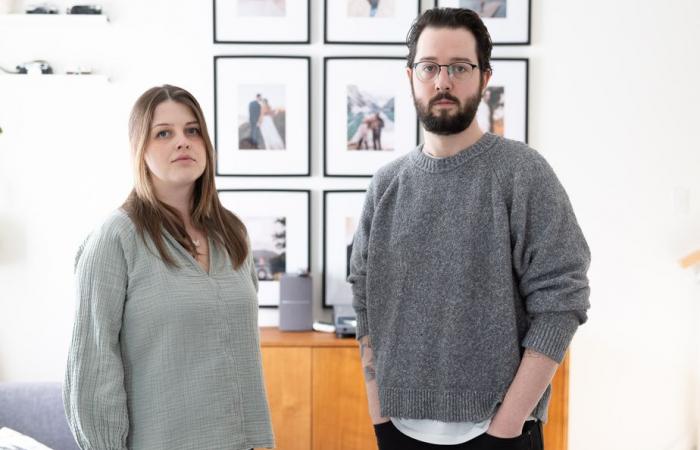When they went with their four-week-old baby to the dentist on June 28, 2023, Laurence Hardy and Nicolas Beauchemin had no idea that they would come out in an ambulance with their baby in respiratory arrest. All after having undergone an intervention which must have been banal: a frenotomy, or an intervention which consists of cutting the frenulum of the tongue.
Published at 5:00 a.m.
“It’s a real nightmare,” said the mother. “If we had known that there were such significant risks to the intervention, we would have thought twice before doing it,” adds the father.
The second child in the family, little Jules Beauchemin had no health problems, his parents say. But shortly after the baby’s birth, during a routine visit to the home by a CLSC nurse, she allegedly pointed out to Ms.me Hardy and Mr. Beauchemin that their son had a “significant” tongue tie. A condition which, sometimes, can complicate breastfeeding.
With Jules, breastfeeding was going well, says Mme Hardy. But after obtaining this information, the parents say they had questions. They therefore went on June 28, 2023 to the clinic of dentist Marie-Ève Grégoire.
We really went there with the aim of getting advice on what was best for him.
Laurence Hardy
The parents claim to have first met a breastfeeding consultant, Marie-Ève Sturrock, in the dentist’s clinic in Saint-Jean-sur-Richelieu. This would have given them “several arguments” to convince them to carry out a frenotomy, the parents say. As advantages “in terms of diet when he was going to start eating, in terms of speech when he was going to start speaking”, lists Mme Hardy. Impacts on self-esteem would also have been mentioned, since these children would sometimes be called “butt talkers” at school, says M.me Hardy. “It seemed like a no-brainer that we had to move forward with frenotomy,” she adds.
The procedure also seemed “ordinary, quick and painless,” says Mr. Beauchemin. No anesthesia. Just a laser device that allows you to cut the tongue tie with a jet of water. Among the few possible risks, we would have mentioned breastfeeding perhaps a little more difficult in the first two or three days following the procedure, says the father. Or, the tongue tie could reattach itself and a new procedure may need to be performed. “It seemed like little risk for a lot of benefit for the rest of his life,” says Mr. Beauchemin.
Shortly after the meeting with the breastfeeding consultant, dentist Marie-Ève Grégoire performed the frenotomy, the parents testify. To do this, Jules would have been swaddled and placed in the arms of his father who was sitting in the dentist’s chair, they report. The intervention would have been short. A few minutes at most.
But as soon as the little one was put back in his mother’s arms, she said she noticed that “his cries were different.” “I unswaddled him. Quickly it turned blue and soft,” says Mme Hardy. The parents say that resuscitation maneuvers were initiated before they left by ambulance with Jules for the hospital, where the baby was pronounced dead.
The exact cause of death remains unknown since the coroner’s report has not yet been released.
PHOTO MARTIN TREMBLAY, THE PRESS
Footprints of Jules Beauchemin, second child of the family
The shock for the family is immense. “You can’t prepare for this.” We had a child who was not sick,” breathes Mr. Beauchemin.
“It was unreal. You never get over that,” says Mme Hardy. The parents filed a complaint with the Order of Dentists in this matter.
-Accused of having shared her fees
The case before the Disciplinary Council will be heard starting this Monday in Montreal. Six counts were filed against dentist Marie-Ève Grégoire, including that of having recommended a frenotomy “without having sufficient knowledge of the facts which justified it”, of having “failed to respect her duty of information towards the parents” by providing them with “incomplete or erroneous information as to the nature and extent of the problem which emerged from the condition” of the baby as well as the “risks and benefits linked to the recommended treatment, namely a frenotomy”.
Marie-Ève Grégoire is also accused of having “tolerated” that “Marie-Ève Sturrock, a person who is not a member of the Order of Dentists of Quebec, carries out dental procedures reserved for dentists”, i.e. “diagnosing a lingual frenulum and a restrictive labial frenulum and prescribe a frenotomy.” Finally, the dentist is criticized for having “paid part of her fees for frenotomy treatments to Marie-Ève Sturrock”.
The Press tried to contact Mme Grégoire last Thursday, but her office indicated that she was not giving any interviews. The Press also tried to contact Mme Sturrock Friday, without success.
Controversial intervention
Treasurer of the Association of Otorhinolaryngology and Head and Neck Surgery of Quebec, Dr.r Alain Moukheiber explains that very few complications are generally linked to frenotomy. Frenotomy can be performed by family doctors, certain specialist doctors or dentists. It involves cutting the frenulum of the tongue – the membrane that connects the floor of the mouth to the tip of the tongue – using a laser tool or scissors.
In a press release published in 2022, the National Academy of Medicine of France indicated that “despite the simplicity of the surgical procedure” of a frenotomy, and even if complications “remain rare”, some can occur such as “hemorrhages, lesions tissue collaterals, airway obstruction, refusal to breastfeed, oral aversion, infection or increased duration of breastfeeding post-surgery.
The use of frenotomy is a growing phenomenon all over the world.
In its press release, the French National Academy of Medicine questioned “the spectacular increase, in France and around the world, in lingual frenotomy” in infants. This is “an aggressive and potentially dangerous gesture for newborns or infants,” indicated the Academy.
In a notice posted on its website, the Canadian Pediatric Society (CPS) mentions that “enormous controversy surrounds the diagnosis, clinical significance and management” of ankyloglossia. A condition that can be defined as a “restriction of movement of the tongue,” explains the head of surgery at the Montreal Children’s Hospital, otolaryngologist Sam Daniel. Ankyloglossia is “often caused by a tongue tie that is too short,” he says. Without commenting on the specific case of Jules Beauchemin, the Dr Daniel mentions that “a lot of people have that. That doesn’t mean we have to do something.”
“Most infants with ankyloglossia are asymptomatic and have no problem feeding,” writes the Canadian Pediatric Society. A frenotomy may be indicated in certain cases if the restriction is significant and complicates breastfeeding, note the Drs Daniel and Moukheiber. “But you have to have ruled out other causes for the breastfeeding problem first,” says Dr.r Daniel. The two doctors emphasize that ankyloglossia generally has no impact on language development in young people.
According to the Canadian Pediatric Society, as health authorities hammer home the benefits of breastfeeding, “pressure is greater than ever to diagnose ankyloglossia as a cause of breastfeeding failure, thus increasing the demand for frenotomy “.
A study published in 2020 in the Journal of Otolaryngology – Head & Neck Surgery by the Dr Eric Wei demonstrated that “from 2012 to 2016, there was a 110.4% increase in reported hospital-based ankyloglossia diagnoses [aux États-Unis]with a similar increase in lingual frenotomy procedures.”
Jules Beauchemin’s parents hesitated for a long time before publicizing their story. “But our goal is to raise awareness among the public and health professionals about this intervention,” says the father. “So that no more parents experience what we experienced,” adds the mother.
Learn more
-
- From 4.2% to 10.7%
- Prevalence of ankyloglossia (tongue mobility problem) in infants
source: Canadian Pediatric Society






